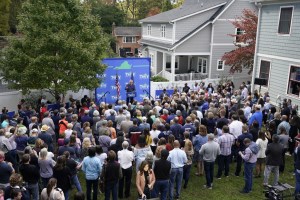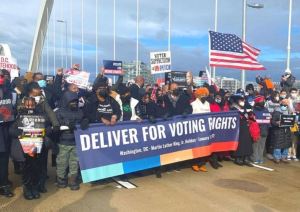
Democratic gubernatorial candidate former Virginia Gov. Terry McAuliffe speaks to supporters during a rally in Richmond, Va., Sunday, Oct. 31, 2021. McAuliffe will face Republican Glenn Youngkin in the November election. (AP Photo/Steve Helber)
By Lawrence Dukes
Special to the AFRO
The gubernatorial election in Virginia is down to the wire. Candidates Terry McAuliffe and Glenn Youngkin are making last-minute efforts to win the coveted spot.
Democrat McAuliffe served as governor in Virginia from 2013-2017. Republican challenger Youngkin is a disciple of former President Donald Trump. Younkin is a former investment firm executive/businessman.
Over three months, the race tightened.
On Oct. 26, a USA Today/Suffolk University poll reported that both McAuliffe and Youngkin were tied, each with 45% of voter approval.
On Sept. 20, the L. Douglas Wilder School of Government and Public Affairs at Virginia Commonwealth University posted the results of their statewide poll. 43% of voters favored McAullife while 37% of voters favored Youngkin.
In August, the Christopher Newport University Watson Center for Civic Leadership reported that Democrats were leading in all statewide races for political office. McAullife had a 50% approval rate compared to 41% of voters who chose Youngkin.
A big reason for the tight race is Virginians’ low approval rating towards Joe Biden.
Monmouth University of New Jersey also conducted polls and research on the upcoming elections in Virginia as well. Biden has a 43% approval rating in the commonwealth compared to a 52% disapproval rating. Republican voters were also more likely to get out and vote compared to Democratic voters, according to the polling. From August through September, voter engagement within the Republican party was higher compared to Democrats.
Republicans are also more enthusiastic voters than Democrats in Virginia. There was a 13-point difference in August, (34% Republican vs 21% Democrat) and a 13% difference in September, (44% Republican vs 31% Democrat. That number peaked at a 23-point difference in October. Republicans [49%] were more enthusiastic compared to only 26% for Democrats during October.
The Larry Sabato Crystal Ball at the University of Virginia Center for Politics posted an article on Virginia’s tight gubernatorial race. One of the questions raised was why is the race so close?
Answer: that Virginia’s governorship has a history of being won by the party that does not reside in the White House. However, that was not the case when McAullife first was elected governor in 2013.
McAullife is looking to become the first governor since 1965 to be re-elected. McAullife recently enlisted the help of former President Barack Obama. Obama on Oct. 24 in Richmond called on Democratic voters to get out and vote.
Although Virginia is a blue state, Obama believes that complacency among Democratic voters can be a hindrance come Nov. 2.
The last person to accomplish that feat was Mills Godwin. In 1965, Godwin successfully won as a Democrat. Eight years later, Godwin won as a Republican. Although Youngkin is a Trump supporter, he’s not viewed in the same vein. Come the day of the general election this could be the deciding factor.
Youngkin is also garnering more voters because of his stance on several issues. Education, economic growth, and healthcare appear to be the biggest concerns among voters.
According to a report by Julia Manchester of The Hill, 80% of voters that are concerned with healthcare backed McAullife, compared to 12% of voters backing Youngkin. However, Youngkin leads McAullife by 13 points in the jobs and education department. 50% of voters also believe that parents should be able to have an influence and dictate what children are being taught in schools. Youngkin is in favor of parents controlling the curriculums in schools.
Regarding covid-19, both McAullife and Youngkin are supporters of the vaccines and the science behind them. However, they differ on the vaccine mandates. A McAullife spokesperson stated that the candidate has called on employers, hospitals, schools, and other places of business to mandate vaccines for employees. However, Younkin is in favor of that stance being a matter of preference with businesses and employers.
Early voting has also factored into the election. According to statistics posted from the Virginia Public Access Project, as of Oct. 27, 788,644 early votes had been cast. Compare that number to 195,634 total early votes that were counted in the 2017 election.
It’s safe to say that the voters realize the importance this election will not only have on the Commonwealth of Virginia, but the United States.
The writer is a student in the School of Global Journalism and Communication.
Help us Continue to tell OUR Story and join the AFRO family as a member – subscribers are now members! Join here!
The post Polls reveal tightening Virginia governor’s race appeared first on AFRO American Newspapers .










